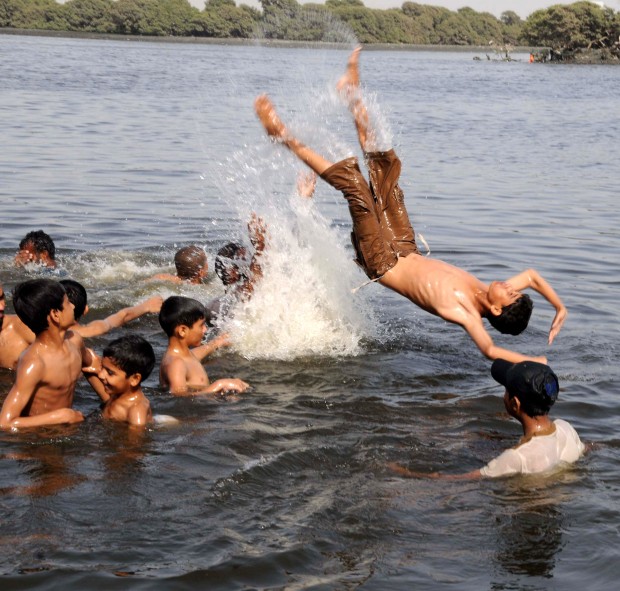Karachi heat wave claims 700 lives

KARACHI, May 3, 2015 (Xinhua) — Pakistanis paddle in a canal during a hot day in southern Pakistani port city of Karachi on May 3, 2015. Temperatures reach over 40 degrees Celsius in many parts of the country. (Xinhua/Masroor)
The scorching heat wave in Karachi, since the start of Ramadan has claimed around 700 lives till Tuesday night, according to health and rescue officials.
“So far, we have received over 50 dead bodies at Jinnah Post-Graduate Medical Centre (JPMC) since Saturday night,” said Dr. Seemin Jamali, head of the hospital’s emergency department.
According to Dr. Jamali, more than 100 people, whether admitted alive or dead, had lost their lives owing to heat-related illnesses at JPMC alone.
“They may have been suffering from different diseases but most of them died of heat stroke or heat exhaustion,” said Dr. Jamali.
A large number of the deceased were old people but a few young patients were admitted in critical condition and later passed away during treatment.
“Most of them were brought by their relatives,” said Anwar Kazmi, the Edhi Foundation spokesperson.
“We can’t be sure about the exact causes of their deaths— whether or not they died of heat cannot be ascertained,” said Mr. Kazmi.
But Kazmi did say that relatives of those who died told Edhi volunteers that due to extreme weather conditions, they could not keep dead bodies of their dear ones at home.
While Saturday was the hottest day of this year’s summer in Karachi, where the mercury shot to 45 degrees Celsius, the maximum temperature of 48 degrees Celsius was recorded in three districts of Sindh — Jacobabad, Larkana and Sukkur.
He said that the minimum temperature recorded in Karachi on Saturday was 32 degrees Celsius while humidity — a measure of the amount of moisture in the air — was 45 per cent.
The highest temperature Karachi has ever experienced was 48 degrees Celsius on May 9, 1938.
The high temperatures were made worse by frequent power outages, sparking protests in several parts of the city of 20 million.
Electricity cuts, subsequently, crippled Karachi’s water supply system, hindering the flow of millions of gallons of water to consumers.
Prime Minister Nawaz Sharif has warned electric supply companies that he would not tolerate power outages during Ramadan, an official in Sharif’s office said.
Karachi University in a statement said it had postponed its exams for at least a month due to the extreme weather.
Doctors have advised avoiding exposure to the sun and wearing light cotton clothes.

























































